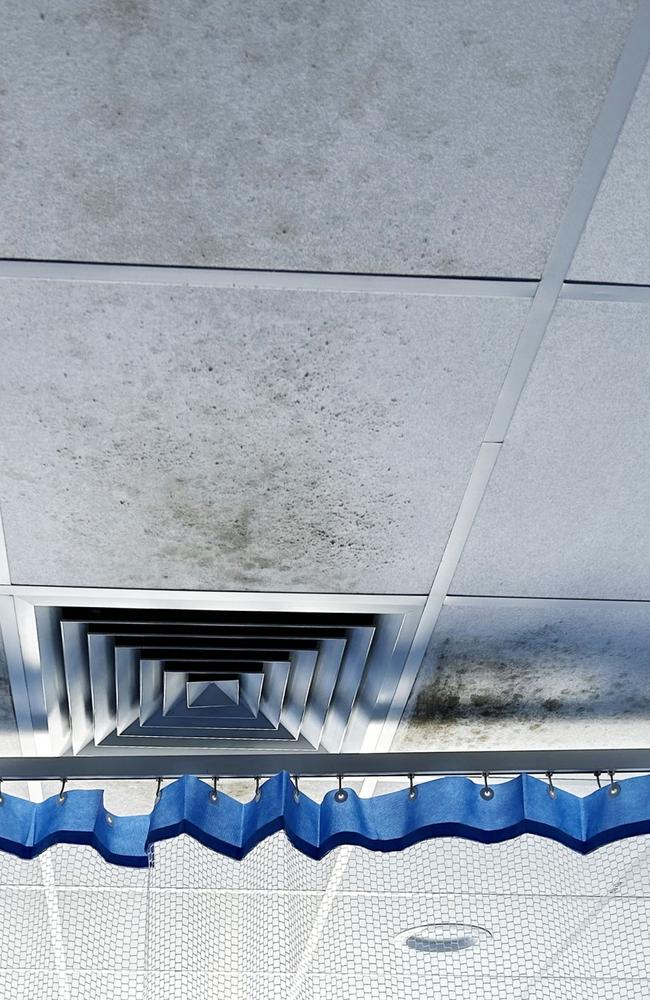Thick mould evident on ceiling of major Brisbane hospital
Dangerous thick black mould has been spreading in a major public hospital where elderly patients have been battling infections including pneumonia.
Brisbane City
Don't miss out on the headlines from Brisbane City. Followed categories will be added to My News.
Dangerous thick black mould has been spreading in a major public hospital where elderly patients have been battling infections including pneumonia.
Ceilings in the 9BN ward in the Royal Brisbane and Women Hospital’s Ned Hanlon Building have been described as “filthy and disgusting” by a patient visitor who sent damning photographs to The Courier-Mail.
It comes as the Australian Medical Association warns certain mould not only causes pneumonia but can exacerbate the lung condition and cause secondary infections and “severe illness” – in any patient.
Real estate agent Amanda Butler said she was “horrified” to see ceilings caked with mould when visiting a 79-year-old friend with pneumonia on January 21.

“If we can’t have sterile hospital environments, people can’t be expected to get better and more unnecessary deaths will result,” Ms Butler, of Ascot, said.
She said her friend – who was still too ill to speak to The Courier-Mail – was in bed number 40 after being brought in as an emergency patient on January 10 but Ms Butler saw “filthy and disgusting ceilings in all rooms to the right of the corridor”.
When shown the photos, Gerard Murtagh, CEO of mould removal company MouldMen, said he would “highly suspect these mould spores are multiplying and spreading, and I can guarantee that’s what we would find with air and surface sampling”.
“The fact that maintenance staff haven’t swiftly come in and replaced those panels is beyond me – that’s the point of them, they’re easy to replace,” Mr Murtagh said.
“I would expect our hospitals to be the safest places for Queenslanders and if my relative was staying in conditions like these, I’d have them removed immediately.”
Maria Boulton, president of the Australian Medical Association (Queensland), said mould could cause pneumonia and for someone already battling the lung infection, breathing in spores could exacerbate their condition.
Dr Boulton also said people who were immunosuppressed – which could mean anyone admitted to hospital – would be “at risk of secondary infections and severe illness if exposed to pathogenic mould”.
“Hospitals care for the most vulnerable in our community so it is essential they have very rigorous systems in place to control any outbreaks,” she said.
Dr Boulton said the AMA had not received any complaints from its members about mould but “all healthcare staff deserve a safe working environment”.
Ms Butler said her elderly friend was transferred on January 24 to the Surgical Treatment and Rehabilitation Service in Herston where she was still trying to recover from pneumonia.
A Metro North government health spokesperson said the mould was “recently identified as part of increased surveillance and is believed to be caused by the ongoing rain and humidity”.

“Steps are currently under way to address this situation, including cleaning and replacement of ceiling tiles.”
Work is expected to be completed next week.
“We are confident in our mould management processes and reject any suggestion patient safety is at risk,” the spokesperson said
“Metro North Health has comprehensive strategies in place for the management of mould including regular monitoring and maintenance, cleaning, air-testing, and HEPA-filters for high-risk areas.
“Where mould is identified, prompt mitigation action is taken, including risk assessments to ensure no patients are at risk.”
Mr Murtagh said when hot air with high humidity enters through an open door, as would happen when hospital staff or visitors come in, the moisture hits the coolest point – where the airconditioning is – and the condensation breeds mould.
“That a hospital hasn’t actioned this sooner is a question for them, but it would come back to the team knowing the severity of the mould growth and what could be causing patients to be getting sicker,” he said.



